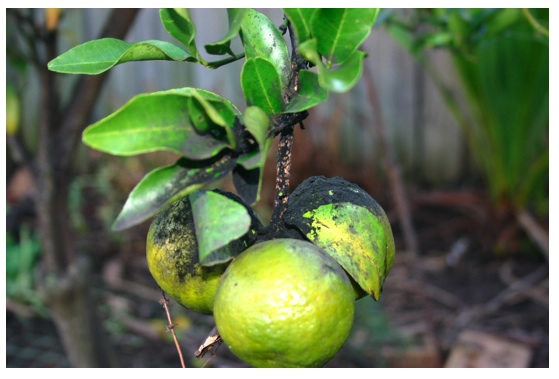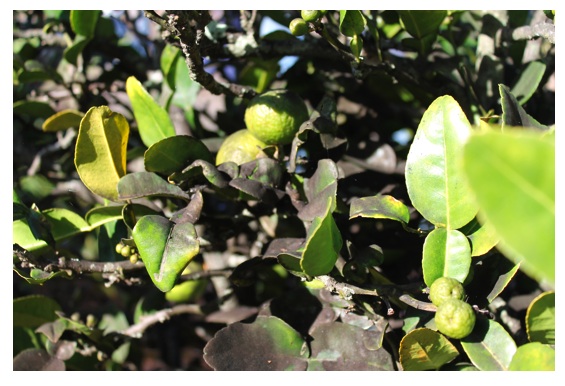 Lemon trees and other citrus trees commonly become unproductive and have a host of problems, including ants and a covering of dirty mold on trees.
Lemon trees and other citrus trees commonly become unproductive and have a host of problems, including ants and a covering of dirty mold on trees.
It’s actually more common that you might realise but luckily, it’s very easily fixed.
The problem revolves around 3 typical conditions shown on the citrus tree. Now the evil trinity of the citrus world is finally revealed!!
Can you spot these on your citrus trees:

Scale insects
Scale are tiny little sap sucking insects that stick to the mid rib, stems and branches of your lemon or citrus tree. They protect themselves with a hard coating that looks like a scale. It can look like anything from tiny white hard scales to soft chocolate brown blobs. The scale insect produces or excretes a sticky sugary substance called honeydew as it feeds on the plant tissue. Your lemon tree can become weakened and reduce productivity due to a severe attack of scale.
Ants
Ants are attracted to the sticky honeydew that is produced by the scale insects. In exchange for this, they protect the scale from natural predators so that the sticky sugary substance continues. The ants don’t really harm the citrus tree but act as an aid in the scale’s survival.
Sooty Mold (Mould)
A sooty grey mold will often cover your lemon tree or citrus. It grows on the sugars produced by the honeydew and looks quite unsightly if it becomes out of control. The sooty mould can reduce the tree’s ability to photosynthesize if it’s a really complete covering. Get rid of the honeydew and you get rid of the mold.

All 3 problems stem from the scale attack. So get rid of the scale and you’ll control the rest as well.
Getting rid of scale insect attack on citrus trees
A blast with the hose will often cure a slight attack of scale on citrus. Natural predators like lady bugs (ladybird beetles) and parasitic wasps are also biological controls for scale insects. Attract these predators with plenty of flowers in the garden to help control and prevent more severe outbreaks.
If the situation is a little more dire than that, then you may want to use some oil to soften the scale coating and then suffocate the insects. I’d recommend Eco-oil with HIPPO enhancement (HIPPO = Herbivore Induced Plant Protection Odour) to do the job. It may take 2 or 3 weekly applications to get it under control if the outbreak is severe.
Ultimately your pest problems are a sign of a stressed plant. Usually stress is in the form of nutrient or water stress. So ensure that you keep your lemon trees and other citrus trees well fed and well watered. A nutritionally dense plant actually repels pests and you won’t have any trouble with scale at all.
Fertiliser for Citrus
My fertiliser regime consists of lots of compost and chicken manure in late winter, only once a year. Fish and seaweed solution regularly sprayed on the foliage can also help strengthen the plant and promote strong growth that will protect your lemon tree from damage. I never feed it again in summer because it will only encourage soft leaf growth that can easily be damaged at a time when scale insect and other pests are around in droves.




 Twitter
Twitter Facebook
Facebook
A Hippo could wipe everything out. Luckily you provided a description 🙂
Thanks for the tips